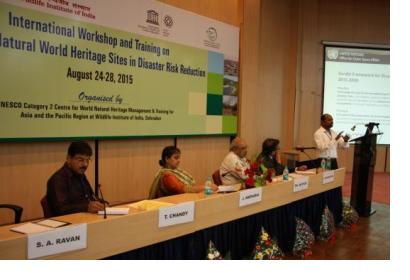The International Workshop on the Role of World Natural Heritage (WHS) Sites in Disaster Risk Reduction (DRR) was organised by UNESCO Category 2 Centre (C2C) World Natural Heritage Management and Training for Asia and the Pacific Region based at Wildlife Institute of India. The event was performed in Dehradun city on 24 and 25 August. The main objectives of the workshop were:
· To identify and assess Natural and man-made disaster risks at World Heritage properties in the Asia-Pacific Region,
· To raise awareness about the need to integrate special concern for Natural and Mixed World Heritage properties into national disaster reduction policies and develop an Action plan for Disaster Risk Reduction in World Heritage Management plans;
· Carry out training for managers of natural and mixed World Heritage properties in disaster Risk Reduction and adaptation strategies.
Shirish Ravan, head of UN-SPIDER Beijing Office participated in the workshop as a panellist from the first technical session on “Defining and identification of Disasters in World Natural Heritage Sites of the Asia-Pacific”, and introduced concepts of Ecosystem based Disaster Risk Reduction (Eco-DRR), Ecosystem based Adaptation (EbA) and the role of earth observation. Ravan also tackled DRR in World Natural Heritage Sites in Asia and the Pacific Region: Sharing experiences and best practices, as a Chair of this second technical session.
| Attachment | Taille |
|---|---|
| Workshop Proceedings | 5.11 MB |

